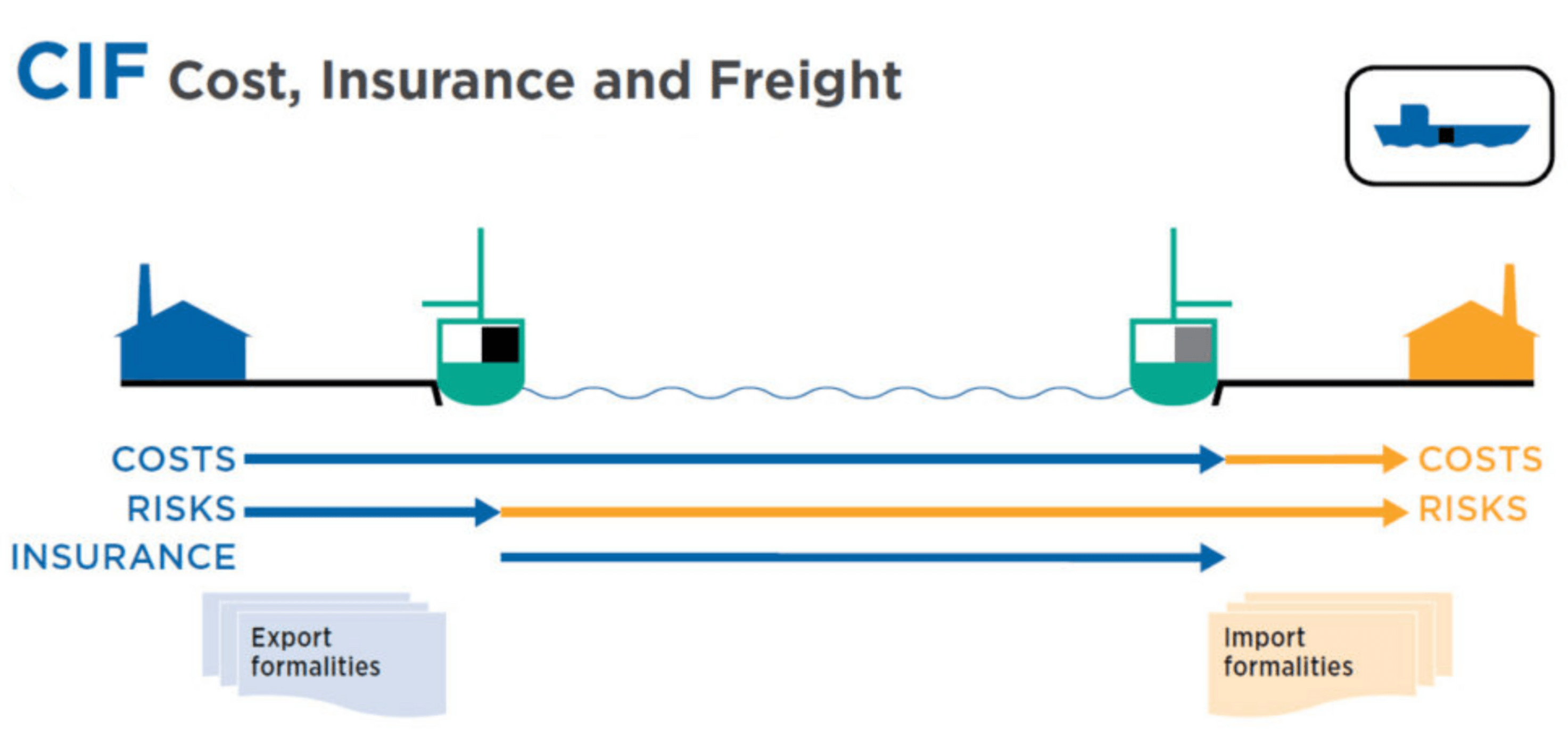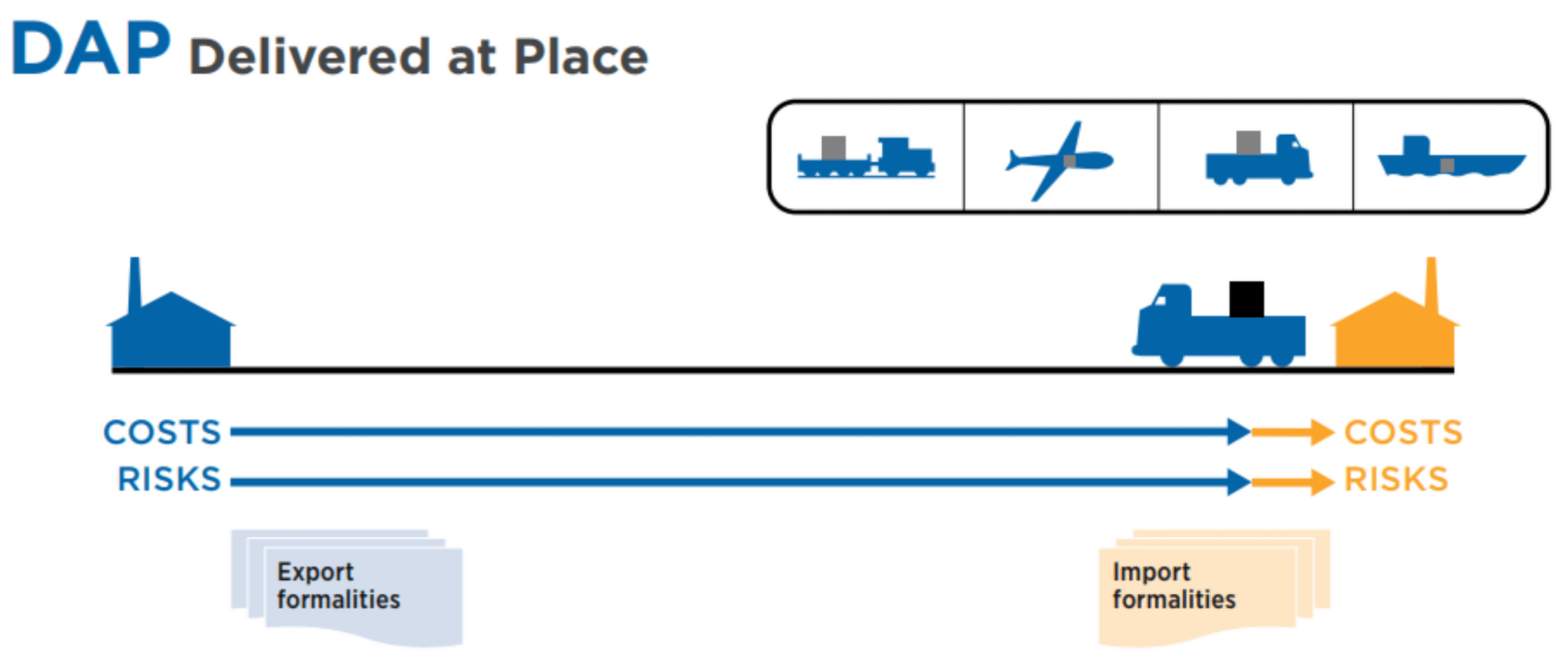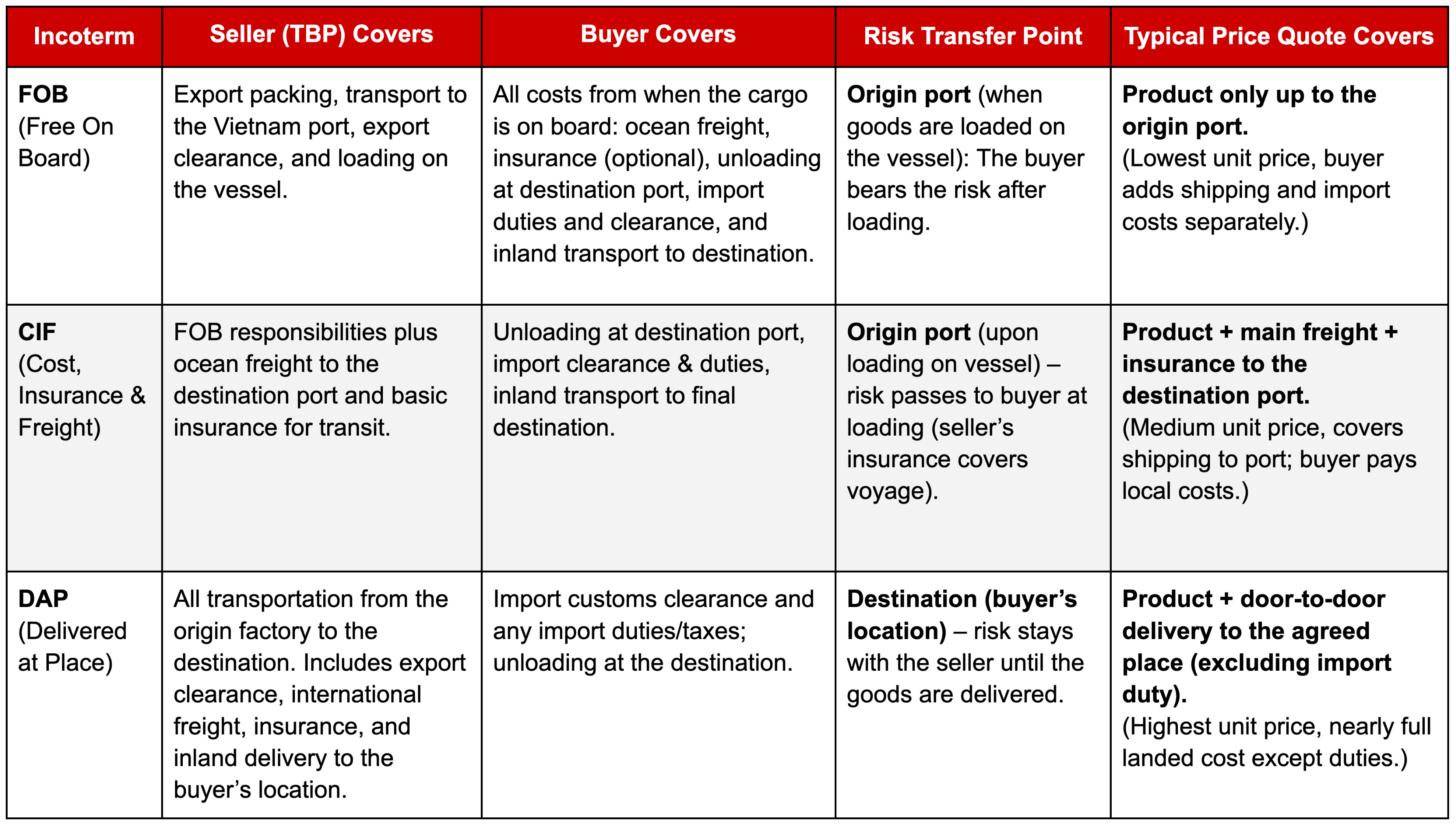Introduction
For automotive parts distributors, OEM buyers, and fleet procurement managers, choosing the right Incoterm can impact pricing, control over the shipping process, and profit margins. This guide introduces TBP Auto’s comprehensive Incoterms overview, focusing on FOB, CIF, and DAP, to help importers make informed decisions. We’ll cover each term’s buyer vs. seller responsibilities, practical insights on cost and control, and TBP’s shipping policy.

FOB – Free On Board (Buyer Manages Shipping)
FOB (Free On Board) means the seller delivers goods onto a vessel at the origin port, and from that point onward, the buyer assumes responsibility. Specifically:
- Seller (TBP Auto): Responsible for production, packaging, inland transport to the export port (e.g., Hai Phong, Vietnam), and export clearance. TBP Auto ensures the brake drums are loaded onto the ship and provides all necessary export documentation.
- Buyer (You): Takes charge once the drums are on board. You arrange and pay for the main ocean freight from the origin port to the destination, handle insurance if desired, and manage import clearance, duties/taxes, and inland delivery to your facility.
Example: If TBP Auto quotes FOB Hai Phong Port, we will get the brake drums on a vessel at Hai Phong. As the buyer, you would contract a shipping line or freight forwarder to transport the container to, say, Los Angeles, take care of U.S. customs, and truck the drums to your warehouse. The risk transfer occurs at loading: once the drums are on the ship, any transit risk or costs (beyond what TBP Auto arranged) are yours.

Why choose FOB? FOB offers maximum control over shipping, especially for experienced distributors. You can select your preferred carrier and optimize schedules. Brake drum FOB pricing appears lower than CIF or DAP because it excludes international freight and insurance – you pay only for the product and origin handling.
Keep in mind that under FOB you’ll need the in-house expertise or a reliable freight forwarder to handle the logistics from the port onwards. If something goes wrong during transit (delays, damage, etc.), it’s on you to coordinate with insurers or carriers. Overall, FOB is favored by importers who are confident managing international freight and want control in their supply chain.
CIF – Cost, Insurance & Freight (Seller Ships to Your Port)
CIF (Cost, Insurance, and Freight) means the seller arranges and pays for moving the goods to the destination port, including the cost of marine insurance, while the buyer takes over after the goods arrive at port. Under CIF, the split in responsibilities is as follows:
- Seller (TBP Auto): Handles everything as in FOB (production, packaging, export formalities, loading) plus the main carriage – books and pays for the ocean freight to the agreed destination port. TBP Auto also arranges minimum insurance coverage for the cargo during transit. The quoted price CIF Your Port includes the cost of shipping and insurance.
- Buyer (You): Assumes responsibility once the vessel arrives at the destination port. You take care of unloading costs, port fees, import customs clearance, duties and taxes, and transportation from the port to your warehouse or distribution center.
Example: With CIF Los Angeles (LA), TBP Auto would load the brake drums on a ship and pay for transportation to LA and insure the shipment. When the container lands at LA port, you (or your customs broker) clear the goods through U.S. Customs, pay any import duty on the drums (calculated on the CIF value, which includes the freight cost), and then arranges trucking to your facility.

Why choose CIF? CIF is often a good middle ground for buyers who want to simplify logistics without taking on full door-to-door service costs. For a buyer who may not have a strong freight forwarder or who is importing for the first time from a new origin, CIF reduces complexity – you essentially get the goods delivered to your country and only have to handle local steps.
From a cost perspective, a CIF quote is higher than an FOB quote because it includes freight and insurance. It shifts some costs into the product invoice, which can affect things like import duty (since duties are often calculated on the cost of goods plus freight).
Control is also moderate: while you don’t choose the carrier or route, you still control what happens after the port arrival. If timing and route are critical, you might find CIF less flexible than FOB, but many buyers accept that tradeoff for convenience.
In summary, CIF is convenient for buyers who want the supplier to manage overseas transport. You’ll still be responsible for the import paperwork and final leg, but you avoid the hassle of international shipping coordination. Just confirm with TBP Auto what insurance coverage you require for your needs.
DAP – Delivered at Place
DAP (Delivered at Place) extends the seller’s responsibility to almost the entire journey, stopping just short of import clearance.
- Seller’s responsibilities (TBP Auto): We handle nearly all logistics steps, from export clearance in Vietnam to international freight, insurance, and inland delivery to the buyer’s specified location (e.g., warehouse or depot). We cover all transportation costs (except duties and tariffs) and bear the risk until the drums arrive. Under DAP, TBP does not handle duties, tariffs, import customs, or unloading at the final destination.
- Buyer’s responsibilities (You): The buyer manages import clearance, including documentation, customs brokerage, and payment of duties, tariffs, or VAT. The buyer is also responsible for unloading the drums upon delivery.

DAP provides a high level of convenience to the buyer, as the seller coordinates the complex logistics of international transport. It is similar to the term “DDP (Delivered Duty Paid)” but with one key difference: under DAP, import duty and taxes are not paid by the seller. This is important for both parties, as it affects cost and risk allocation.
Example: A distributor in Melbourne orders 400 brake drums (one 20ft. container) from TBP Auto under DAP terms, delivered to their central depot. TBP Auto handles export clearance, ocean freight to the Port of Melbourne, and inland trucking to the depot. The fleet’s Operations Manager clears the shipment through Australian Customs and pays the import duty.
Why choose DAP? It’s quite straightforward: DAP is an excellent choice for buyers prioritizing convenience and certainty over getting the absolute lowest cost. This includes many fleet operators, maintenance contractors, or smaller distributors who may not have international logistics expertise. If your priority is to have the product delivered to your door with minimal hassle, DAP is the way to go.
While the per-unit price under DAP will include all those transportation costs, it frees you from the administrative burden of coordinating shipments and carriers. For many, this trade-off is worth it because it ensures a smooth supply chain. Your profit margin per drum might be slimmer compared to handling freight yourself, but you gain in efficiency and risk reduction.
FOB vs. CIF vs. DAP: Summary of Key Differences
Each Incoterm has trade-offs that can affect your logistics strategy and profit margins. Here’s a comparative look at FOB, CIF, and DAP across key factors that matter to brake drum buyers.

FOB vs. CIF vs. DAP is about balancing cost, control, and convenience. No one term is inherently best – the ideal choice depends on your organization’s capabilities and priorities. Experienced B2B importers often use a mix; for example, they may opt for FOB on regular high-volume orders where they have economies of scale in shipping but maybe request CIF or DDP on smaller one-off purchases or in markets where they lack presence.
TBP Auto’s Approach
At TBP Auto, we aim to make international brake drum procurement smooth and transparent. We understand our customers – whether distributors, OEMs, or fleet operators – have varying logistics capabilities, so we offer flexible shipping terms based on what works best for your operation.
- Consultative quoting: When requesting a quote, our team will ask about your preferred Incoterm or recommend one based on your needs. We’re happy to quote multiple terms for easy comparison.
- Clear documentation support: Under DAP, we don’t handle import clearance or duties, but we do support your process. We provide accurate, complete documentation – commercial invoices, packing lists, certificates of origin – so your customs broker can clear the goods smoothly. Not sure about your country’s import duty rates? We’ll guide you to the right resources to calculate your landed cost accurately.
- Custom solutions: Need a hybrid? We can tailor Incoterms per shipment (for example, FOB for bulk orders, DAP for regional deliveries). Some OEMs use FOB to import centrally and DAP for last-mile distribution. Our logistics team works with you to build flexible solutions that reduce complexity and cost.

TBP Auto is your supply chain partner, not just a parts supplier. Whether you prefer full control or full service, we can manage as much transportation as you need. Choosing the right Incoterm helps you keep margins strong and shipments predictable.
Our recommendation?
- FOB is ideal if you have in-house logistics or forwarders.
- CIF suits buyers who want TBP to handle international freight to port.
- DAP is best when you want delivery to your facility, minus the import clearance, duties and tariffs.
Conclusion
Choosing the right Incoterm – FOB, CIF, or DAP – can significantly impact your total landed cost and shipping experience. FOB offers control and potentially lower costs for those able to manage shipping, CIF provides a middle ground with the supplier handling freight to your port, and DAP gives more convenience at a premium price. Regardless of the term, TBP Auto is committed to supporting you and keeping you informed at every stage of the shipment. Our goal is to deliver trusted braking performance to you with no logistical surprises.
Ready to make your next brake drum order? Contact TBP Auto for a quote and we’ll ensure you get quality products delivered under terms that work best for you. Together, we’ll keep your fleet safely on the road with efficient, cost-effective supply every step of the way.



